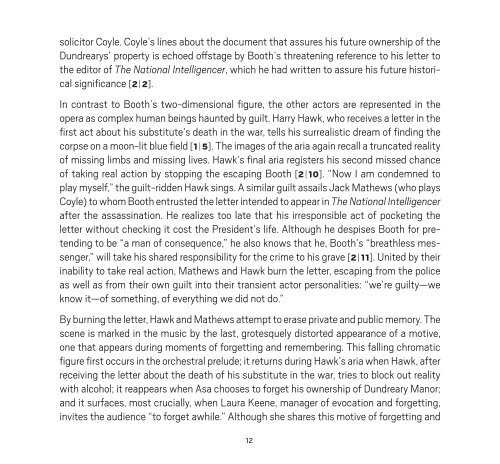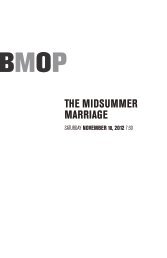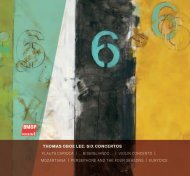Download the album booklet - Boston Modern Orchestra Project
Download the album booklet - Boston Modern Orchestra Project
Download the album booklet - Boston Modern Orchestra Project
You also want an ePaper? Increase the reach of your titles
YUMPU automatically turns print PDFs into web optimized ePapers that Google loves.
solicitor coyle. coyle’s lines about <strong>the</strong> document that assures his future ownership of <strong>the</strong><br />
dundrearys’ property is echoed offstage by Booth’s threatening reference to his letter to<br />
<strong>the</strong> editor of <strong>the</strong> national intelligencer, which he had written to assure his future historical<br />
significance [2 | 2].<br />
in contrast to Booth’s two-dimensional figure, <strong>the</strong> o<strong>the</strong>r actors are represented in <strong>the</strong><br />
opera as complex human beings haunted by guilt. Harry Hawk, who receives a letter in <strong>the</strong><br />
first act about his substitute’s death in <strong>the</strong> war, tells his surrealistic dream of finding <strong>the</strong><br />
corpse on a moon-lit blue field [1 | 5]. <strong>the</strong> images of <strong>the</strong> aria again recall a truncated reality<br />
of missing limbs and missing lives. Hawk’s final aria registers his second missed chance<br />
of taking real action by stopping <strong>the</strong> escaping Booth [2 | 10]. “now i am condemned to<br />
play myself,” <strong>the</strong> guilt-ridden Hawk sings. a similar guilt assails Jack ma<strong>the</strong>ws (who plays<br />
coyle) to whom Booth entrusted <strong>the</strong> letter intended to appear in <strong>the</strong> national intelligencer<br />
after <strong>the</strong> assassination. He realizes too late that his irresponsible act of pocketing <strong>the</strong><br />
letter without checking it cost <strong>the</strong> president’s life. although he despises Booth for pretending<br />
to be “a man of consequence,” he also knows that he, Booth’s “breathless messenger,”<br />
will take his shared responsibility for <strong>the</strong> crime to his grave [2 | 11]. united by <strong>the</strong>ir<br />
inability to take real action, ma<strong>the</strong>ws and Hawk burn <strong>the</strong> letter, escaping from <strong>the</strong> police<br />
as well as from <strong>the</strong>ir own guilt into <strong>the</strong>ir transient actor personalities: “we’re guilty—we<br />
know it—of something, of everything we did not do.”<br />
By burning <strong>the</strong> letter, Hawk and ma<strong>the</strong>ws attempt to erase private and public memory. <strong>the</strong><br />
scene is marked in <strong>the</strong> music by <strong>the</strong> last, grotesquely distorted appearance of a motive,<br />
one that appears during moments of forgetting and remembering. this falling chromatic<br />
figure first occurs in <strong>the</strong> orchestral prelude; it returns during Hawk’s aria when Hawk, after<br />
receiving <strong>the</strong> letter about <strong>the</strong> death of his substitute in <strong>the</strong> war, tries to block out reality<br />
with alcohol; it reappears when asa chooses to forget his ownership of dundreary manor;<br />
and it surfaces, most crucially, when laura Keene, manager of evocation and forgetting,<br />
invites <strong>the</strong> audience “to forget awhile.” although she shares this motive of forgetting and<br />
remembering with o<strong>the</strong>rs, she seems to be <strong>the</strong> only one who has <strong>the</strong> power to consciously<br />
thicken or dissipate <strong>the</strong> fog of oblivion. <strong>the</strong> distortion of <strong>the</strong> motive in <strong>the</strong> last act suggests<br />
that Hawk and ma<strong>the</strong>w’s retreat from reality into <strong>the</strong> <strong>the</strong>ater, “where everything,<br />
where nothing ever happens,” is futile, a grotesque distortion of laura Keene’s attempt to<br />
maintain <strong>the</strong> <strong>the</strong>ater as a temporary refuge from reality.<br />
laura Keene’s refuge, however, cannot transform reality. <strong>the</strong> contrast between <strong>the</strong> world<br />
of <strong>the</strong>ater and <strong>the</strong> world of reality creates guilt—a guilt that, like division, permeates <strong>the</strong><br />
opera. it is only Booth, simplistic poseur that he is, who is untouched by guilt. lincoln’s<br />
melancholy figure is constantly shadowed by a sense of guilt—guilt for <strong>the</strong> shameful condition<br />
of slavery, for <strong>the</strong> truncated country, for <strong>the</strong> bloodshed caused by <strong>the</strong> “pestilent<br />
war.” although guilt frequently colors <strong>the</strong> lines of <strong>the</strong> actors, <strong>the</strong> character who takes<br />
on most of <strong>the</strong> guilt in <strong>the</strong> opera is laura Keene. she is <strong>the</strong> one who invited lincoln to<br />
watch <strong>the</strong> play, who encouraged her audience to “leave <strong>the</strong> world behind” and set sorrows<br />
free, who promised “<strong>the</strong> north and south will pass away, forgiven and forgotten” [1 | 15].<br />
But her guilt is more global than that. accused after <strong>the</strong> assassination by mary lincoln<br />
of having <strong>the</strong> immoral profession of acting, she poses questions about <strong>the</strong> role of art in<br />
general, about artists’ right to practice <strong>the</strong>ir art during war, and about <strong>the</strong>ir self-deceptive<br />
belief that “art brings peace.” at <strong>the</strong> end she is forced to acknowledge art’s powerlessness:<br />
“i couldn’t keep <strong>the</strong> bloodshed out; i couldn’t keep <strong>the</strong> war from breaking in.”<br />
in contrast to Booth who remains trapped in his actor’s pose, laura Keene manages to<br />
assume roles that carry significance beyond <strong>the</strong> events surrounding lincoln’s death. after<br />
<strong>the</strong> assassination her guilt transforms her momentarily into lady macbeth, who, turned<br />
insane after her participation in regicide, tries to wash <strong>the</strong> blood off her clo<strong>the</strong>s. “i’ll never<br />
get it out of my sight,” Keene sings frantically. But she is not only <strong>the</strong> <strong>the</strong>ater manager, <strong>the</strong><br />
famous actor, <strong>the</strong> fictitious mary dundreary in <strong>the</strong> play, and lady macbeth in her imagination,<br />
she is also mary magdalene, who, in this passion scene of Good Friday, holds and<br />
washes <strong>the</strong> head of <strong>the</strong> sacrificial victim. Her words, “Jesus, pour down your pity,” uttered<br />
12 13










